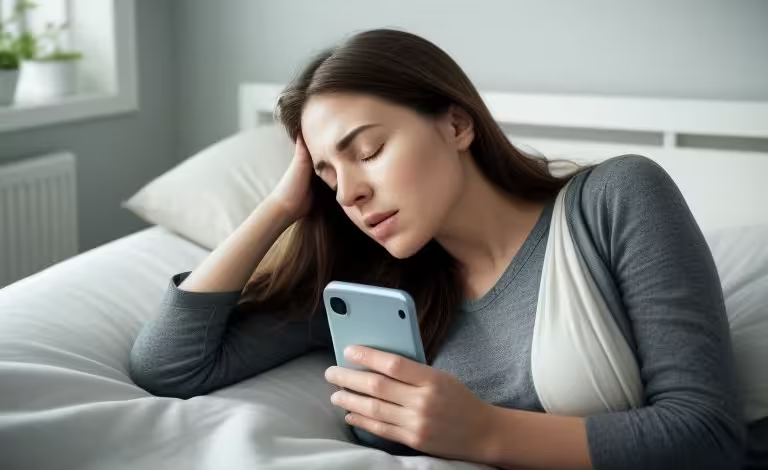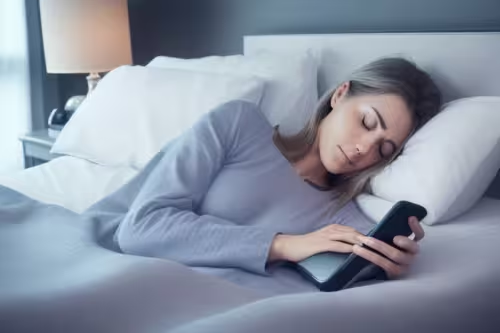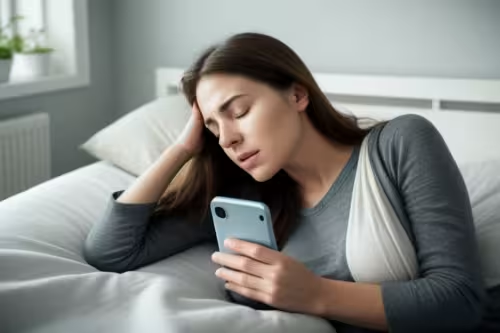

7 Health Risks of Sleeping Close to Smartphones
Are you guilty of scrolling on your phone in bed? According to the National Sleep Foundation in the US, many people do this, which can cause sleep and mental health issues. But did you know sleeping close to your smartphone can pose several health risks? Let’s explore these dangers and see how you can protect yourself.
Insomnia
Using your phone before bed can disrupt your sleep. The blue light from screens affects your circadian rhythm, the natural cycle of your body’s changes over 24 hours. This can lead to disrupted sleep and even insomnia if you use your phone 2-3 hours before bed. Research has shown that this blue light impacts our sleep, making it hard to fall asleep and stay asleep.
Eye Health Issues
Staring at your phone screen in bed can strain your eyes. The National Institutes of Health found that long hours on phones increase the risk of eye pain and dryness. Blue light from smartphones can harm your retina, causing blurred vision, dry eyes, itchiness, and headaches. It’s important to give your eyes a break to avoid these issues.
Mental Health Issues
Staying up late on your phone can harm your mental health. Going to bed after midnight is linked to increased risks of depression, especially in teenagers. It also raises stress and anxiety levels. Your mental well-being is just as important as your physical health, so make sure you get enough sleep.

Wireless Radiation
Your smartphone emits wireless radiation, which can be harmful. The World Health Organization (WHO) warns that using phones in bed can increase the risk of head cancer and affect brain activity and cognitive behavior. Keeping your phone close while you sleep exposes you to this radiation, which can have serious long-term effects.
Reproductive Health Problems
Wireless radiation from smartphones can also impact your reproductive health. Studies by the National Health Institutes suggest that this radiation can damage sperm and reduce sperm count in males. For pregnant women, it may cause stress, fatigue, and disturbed sleep, which can affect both the mother and the baby.

Sleep Disruptions
When your phone lights up with notifications at night, it can disrupt your sleep. These interruptions prevent you from reaching deep, restorative sleep, leaving you feeling tired and groggy in the morning. Even if you don't fully wake up, these disturbances can fragment your sleep cycles, reducing the overall quality of your rest.
Increased Stress
Being constantly connected through your phone, especially on social media, can increase your stress levels before bedtime. Scrolling through timelines or reading messages can keep your mind active when it should be winding down for sleep. This heightened mental activity can make it harder to relax and fall asleep peacefully. Over time, this chronic exposure to digital stimulation can contribute to higher levels of stress and anxiety, impacting your overall well-being negatively.
Managing these aspects of phone use before bedtime is crucial for better sleep and mental health. Setting boundaries, such as turning off notifications or establishing a digital curfew, can help create a more peaceful bedtime routine. By prioritizing relaxation and disconnecting from screens, you can improve your sleep quality and reduce stress levels, leading to a healthier and more rejuvenated you each morning.
Practical Tips for Better Sleep
- Keep Your Phone Away: Charge your phone in another room or at least away from your bed.
- Use Night Mode: Turn on the blue light filter on your phone in the evening to reduce eye strain.
- Set a Bedtime Routine: Aim to go to bed at the same time every night to regulate your sleep pattern.
- Limit Screen Time: Try to stop using your phone at least an hour before bedtime.
- Turn Off Notifications: Put your phone on silent or flight mode to avoid disturbances during the night.
The Bottom Line
Sleeping with your phone next to you might be causing more harm than you realize. To maintain better physical and mental health, keep your phone away while sleeping. Following these tips can help you get a good night’s rest and improve your overall well-being.
Lifestyle Changes to Consider
- Break Mobile Addiction: Find other activities to wind down before bed, like reading a book or meditating.
- Reduce Social Media Use: Limit your time on social media, especially before bed, to reduce stress and anxiety.
- Adopt a Healthier Lifestyle: Regular exercise and a balanced diet can improve your sleep quality and overall health.
While your smartphone can be a handy tool, it’s important to manage its use, especially at bedtime. By making small changes, you can protect yourself from the health risks of sleeping close to your smartphone. Stay mindful of your habits and prioritize your health for a better night's sleep and a happier life.



